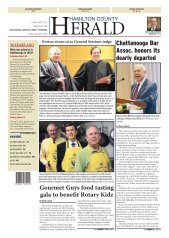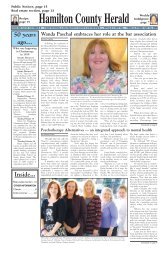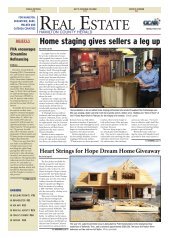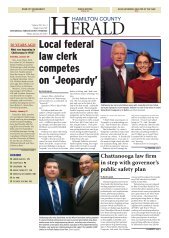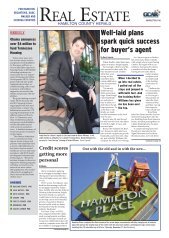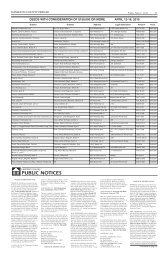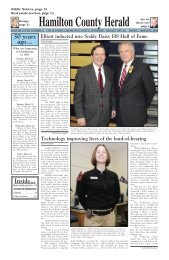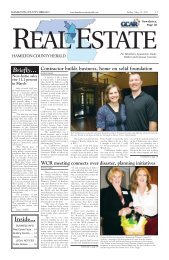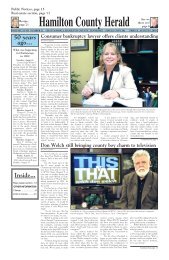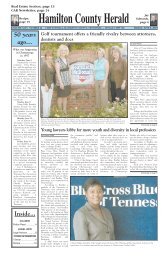12 Friday, <strong>March</strong> 2, <strong>2007</strong> HAMILTON COUNTY HERALD Real estate buck stretches furthest in Indianapolis Inman News City tops nation’s most-affordable list in fourth quarter Indianapolis maintained its standing as the most affordable major U.S. housing market for a sixth consecutive quarter in the fourth quarter of 2006, according to the National <strong>Association</strong> of Home Builders/Wells Fargo Housing Opportunity Index (HOI), released this week. Some 89 percent of Indianapolis homes sold in the fourth quarter were affordable to families earning the area’s median household income of $65,100, and the median sales price of all homes sold in Indianapolis during that time was $113,000, down from the $122,000 median sales price in the previous quarter. Nationwide, housing affordability edged slightly upward due to a noticeable decline in the average mortgage rate and a marginal downshift in the median price of all homes sold. “Today’s HOI reading indicates that 41.6 percent of new and existing homes that were sold during the fourth quarter of 2006 were affordable to families earning the national median income of $59,600,” said NAHB President Brian Catalde, a home builder from Playa del Rey, Calif. “This is slightly better than the 40.4 percent of homes that were affordable to median-income earners in the third quarter and mostly due to more favorable mortgage rates near the end of the year.” The HOI indicates that the national weighted interest rate on fixed- and adjustable-rate mortgages — a key component in calculating the HOI — was 6.52 percent in the fourth quarter, compared with 6.77 percent in the third quarter. Also near the top of the list for affordable major metros this time around were Youngstown- Warren-Boardman, Ohio-Pa.; Detroit-Livonia-Dearborn, Mich.; Toledo, Ohio; and Buffalo-Niagara Falls, N.Y., in that order. Four smaller metro markets outranked all others in terms of housing affordability during the fourth quarter: Springfield, Ohio, was followed by Davenport-Moline-Rock Island, Iowa-Ill.; Bay City, Mich.; and Mansfield, Ohio, respectively. Also, the small housing market of Canton-Massillon, Ohio, tied with Indianapolis on the affordability scale. As for the nation’s leastaffordable major housing market, Los Angeles-Long Beach- Glendale, Calif., captured that title for a ninth consecutive quarter. There, just 2 percent of new and existing homes sold during the fourth quarter were affordable to those earning the Realtors welcome the president’s focus on health care Debate over what to do about the over 46 million Americans living without health insurance continues to intensify across the country. The issue took center stage in <strong>Chattanooga</strong> last week with a visit from President George W. Bush. Access to affordable health insurance has consistently been a key issue for Realtors across the country. Like other self-employed individuals and those who work for small businesses, Realtors make up a group forced into the individual insurance market and are unable to negotiate with Can homeowner association bar worship at its clubhouse? By Robert J. Bruss Inman News Religious group alleges fairhousing violation Until 2004, the Savanna Club Worship Service Inc. conducted its worship services in the Savanna Homeowners <strong>Association</strong> clubhouse or common areas. But the homeowner association received numerous complaints from its members regarding use of the common areas for religious services. One of the reasons for the complaints was such usage was contrary to the stated purpose of making the common areas available for use and enjoyment of the members of the association. insurers for fair health care rates. For years, Realtors have worked with lawmakers in Washington to find solutions that will help meet the needs of working Americans and are encouraged by President Bush’s efforts to adopt reforms. Discussing his plan, the president said, “We need to make sure that we put good policies in place to make sure private medicine is the norm, quality care is given to as many Americans as possible.” He also called for “innovative ways of providing insurance” while also helping After receiving numerous complaints, the association conducted an informal vote of its members. They voted 714 to 434 to prohibit religious services in their common areas. As a result, the association adopted a rule that “No portion of the common areas of Savanna Club may be used for any religious service.” Following enactment of the rule, the worship club continued holding its services. But the homeowner association filed a court petition for mediation. Following mediation, the club stopped holding its religious services in the common areas. Americans save money. The main part of the president’s proposal looks to reform the tax code and allow for a standard deduction for health insurance, up to $15,000 for families and $7,500 for individuals. Another key part that Realtors have been working to see implemented is the allowance of association health plans. <strong>Association</strong> health plans would allow small businesses to join together through trade and professional associations to purchase health coverage, giving them the same advantages and The worship club then brought this lawsuit against the Savanna Club Homeowners <strong>Association</strong>, alleging the rule barring religious services violates the federal Fair Housing Act. If you were the judge, would you rule the homeowner association rule barring religious services in the common areas violates the Fair Housing Act? The judge said no! The evidence shows the homeowner association rule has been applied evenly, and no religious group has been allowed to use the common areas for its religious services, the judge began. Although the worship club has standing to sue, it failed to Gifting real estate not recommended By Robert J. Bruss Inman News Mother’s good deed does inheritor a disservice DEAR BOB: About a year ago, my elderly mother deeded to me her home and two rental properties I manage for her. Her attorney handled the quitclaim deeds and the recordings. Mother died in October 2006. When I talked to my mother’s tax accountant he said, “It’s too bad your mother deeded the titles to you. If you had inherited those properties, you would have a new stepped-up basis of market value and you would owe practically zero tax when you sell them shortly after her death.” Is it true that I don’t get a new stepped-up basis? —Ellen H. DEAR ELLEN: Yes. Unfortunately, you didn’t inherit those properties. You received the titles as pre-death gifts. As the donee, you took over your donor mother’s probably very low adjusted cost basis for the properties. That means, when you sell them, you will owe a large capital gains tax. Unfortunately, your tax accountant is correct. This situation shows why it is often best, especially when a parent anticipates dying soon, not to deed real estate to a potential heir. The obvious reason is then the prospective heir won’t receive a new stepped-up basis to market value on the date of death. NO GUARANTEE A VACANT LAND BUYER CAN GET BUILDING PER- MIT DEAR BOB: I am considering buying a vacant lot on which I want to build a home. What assurances can I receive before the purchase that the building permits and site plans will be approved by the local authorities? I do not want to be stuck with a lot on which I cannot build. —Pat E. DEAR PAT: A buyer of vacant land has no assurances a building permit will be issued, even when the proposed plans exactly meet the zoning and other land-use rules. Depending on the city or county, I’ve seen frustrated developers and landowners stalled for years when neighbors object or variances are required. For this reason, savvy rawland buyers can often pay a modest price, typically 1 percent to 3 percent of the purchase price, for a 12-month option to buy the land at a fixed price. That ties up the property and gives the buyer time to apply for the necessary permits. If they can’t be obtained, all it cost the potential buyer was the forfeited option money. negotiating clout enjoyed by larger companies and labor unions. Members of an association, regardless of where they work and live, could pool their risks and be offered a uniform health care plan that could help offset the rising premiums and costs that are pricing individuals out of the market. Nationwide, the percentage of Realtors without health insurance has nearly doubled over the past 10 years. Given that the average Realtor household includes 2.6 people, the number of uninsured is even greater. present any evidence of violation of the Fair Housing Act or any other law, he continued. Savanna Club is a unique planned community, the judge explained. Its common areas are open to all its members, and there is no evidence of any religious or other discrimination involving purchase or use of residences within the community, he noted. The worship club has not presented any evidence of discrimination, the judge emphasized, because all religious groups are prohibited from holding services in the common areas. “The right to religious freedom must encompass the right HOW TO MAKE A TAX- DEFERRED TRADE FOR DREAM HOME AND PAY NO TAX DEAR BOB: I own two rental properties. Let’s call them A and B. I have never lived in either one. Nor do I intend to. Let’s say I sell A and B on the same day and do an Internal Revenue Code 1031 taxdeferred Starker exchange by identifying and purchasing property C. Assume I rent property C for three years and then move in to make it my principal residence for two years. Then I sell property C. If the total capital gains on A, B and C are less than $500,000 (I am married and my wife would live with me in property C for at least two years), can I sell property C without owing any tax? —Tim McW. DEAR TIM: Yes. But you must hold title to property C at area’s median family income of $56,200. The median sales price of all homes sold in the area during the period was $525,000. Other major metros at the bottom of the housing affordability chart included Santa Ana-Anaheim-Irvine, Calif.; San Diego-Carlsbad-San Marcos, Calif.; New York-White Plains-Wayne, N.Y.-N.J.; and Modesto, Calif., in that order. Among metro areas smaller than 500,000 people, every entry at the bottom of the affordability chart was located in California, starting with Salinas as the least affordable and followed by Napa, Merced, Santa Cruz-Watsonville and Santa <strong>Bar</strong>bara-Santa Maria, Calif., respectively. ❖ “The president is offering some encouraging words on an important issue we’ve supported for many years,” said Jason Farmer, president of the <strong>Chattanooga</strong> <strong>Association</strong> of Realtors. “Allowing for association health plans is a good idea and can make an immediate impact in improving the lives of millions. We hope that our elected officials can come together in a bipartisan manner to work out a solution that makes health insurance affordable and accessible for more Americans,” added Farmer. ❖ to be free from religion,” he added. The Fair Housing Act imposes no “reasonable accommodation” requirement in the context of religious discrimination, the judge ruled. Because the challenged rule of the homeowner association has been applied equally to all religions, there is no Fair Housing Act violation, and the worship club is not entitled to use the common areas, the judge concluded. Based on the U.S. District Court decision in Savanna Club Worship Service Inc. v. Savanna Club Homeowners <strong>Association</strong> Inc., 456 Fed.Supp.2d 1223. ❖ least 60 months because it was acquired in a tax-deferred IRC 1031 exchange. It does not become eligible for the IRC 121 $500,000 principal-residencesale exemption until you have owned it at least five years, of which at least 24 months it was your principal residence. At the time of its acquisition, of course, it must be a “like kind” rental property, and the trade must qualify as a taxdeferred IRC 1031 trade up. Of course, be sure your sales of properties A and B comply with the IRC 1031(a)(3) Starker tax-deferred exchange rules. That means the sales proceeds must be held by a qualified thirdparty intermediary so you never have “constructive receipt” of the sales proceeds. For details, please consult a tax adviser who is familiar with Starker taxdeferred exchanges. ❖
HAMILTON COUNTY HERALD Friday, <strong>March</strong> 2, <strong>2007</strong> 13 Hamilton County Transactions DEED RECORDS FILED 02/12/07 New Horizon Properties LLC to Regions Bank, 5570 Hwy 153, City of <strong>Chattanooga</strong>, Lot 7, Towne Center North, Map Parcel 100I -B-001, $1,461,000. Contractor Yard Inc; Cy Acquisition Corp; Contractor Yard LLC to Pbre Corp, 6006 Lee Hwy, City of <strong>Chattanooga</strong>, Pt Lot 23; Pt 24; Pt 25; Pt 26, Old Crabtree Farm, Map Parcel 158A -E-020, $1,175,000. Ooltewah Holdings East LLC to Regions Bank, Lot 4, Wal-Mart On Little Debbie Pkwy, Map Parcel 132 - -02006, $950,000. Mr Zip Inc Of Tennessee to Jeetu Inc, City of <strong>Chattanooga</strong>, Pt Lot 1, Freeman Smiths, Map Parcel 148D -G-00104, $704,250. Thomas, Debra J; Thomas, Tommy E to Creek Plantation Village LLC, Lot 1; 2; 3, Shannon & Hart, Map Parcel 100 - - 043, $550,000. Joyner, Kendra M; Joyner, Ray C to Creek Plantation Village LLC, City of <strong>Chattanooga</strong>, Map Parcel 100 - -04201, Smith Rd, $470,000. <strong>Chattanooga</strong> Development Groupllc to Carlson, Tracy; Carlson, Derek A, 1020 Reunion Dr, City of <strong>Chattanooga</strong>, Lot 29, Reunion, Map Parcel 171G -A-00218, $330,132. Volz, Dawn; Volz, Ronald to Flynt, Peggy R; Flynt, Guy L, 9525 Thornberry Dr, Ooltewah, Lot 29, Thornberry Hill, Map Parcel 150E -A-031, $275,000. Lounsberry, Vonnie; Lounsberry, David V to Healy, Sheryl G; Healy, Jerome V, Lot 121, Meadow Stream, Map Parcel 114P -A-053, $267,500. Village At Greenway LLC to Lemon, Caitlin; Smith, Tyler, 3512 Kettering Ct, City of <strong>Chattanooga</strong>, Blk Bldg 18, Unit C, Village At Greenway, Map Parcel 117C - A-00905, $261,375. Whitmire, Jo Ann; Whitmire, Ralph Jr to Creek Plantation Village LLC, Hixson, Map Parcel 100 - -036, Dallas & Cassander-Smith Rd, $250,000. Whitmire, Joann H to Creek Plantation Village LLC, Hixson, Map Parcel 100 - - 035, Dallas & Cassander-Smith Rd, $250,000. Word Of Life Church Of <strong>Chattanooga</strong> to Creek Plantation Village LLC, City of <strong>Chattanooga</strong>, Lot 2, Word Of Life Church, Map Parcel 100 - -048, $245,000. Fatherson Partnership to Gilstrap, Tanya M, 6765 Buckhannon Ln, Hixson, Lot 167, Stonewall Farm, Map Parcel 092G -D-013, $235,000. Fowler, John; Swift, Wilma R; Fowler, Wilma S to Rooker, Iman; Rooker, William T, City of <strong>Chattanooga</strong>, Lot 24; 25, Blk C, Drake Forest, Map Parcel 149J -D-024, $230,000. Edwards, <strong>Bar</strong>bara J; Edwards, Jack; Edwards, Benjamin D to Sowell, Brenda S; Sowell, <strong>Bar</strong>ry G, Lot 274, Unit 6, River Cove, Map Parcel 094A -D-035, $227,000. Whitmire, Lois Marie; Whitmire, Robert Lawrence to Creek Plantation Village LLC, City of <strong>Chattanooga</strong>, Map Parcel 100 - -042, Smith Rd, $225,000. Rose, Patricia T; Rose, Lawrence C Jr to Hill, Debra L; Hill, Troy A, 609 River Landing Dr, City of Soddy Daisy, Lot 32, North River Hills, Map Parcel 049I -A-008, $218,900. Strickland, Donna G; Strickland, Bruce R to Dunn, Laura C; Dunn, Jody S, 2820 Deerfield Rd, Ooltewah, Lot 61, Unit 3, Granada Estates, Map Parcel 160C -F- 021, $210,000. Mowles, Edward M; Mowles, Priscilla C to Eberhart, Lawrence, Map Parcel 157P -P-007, S Terrace St, $205,000. Rcs Construction LLC to Newman, Cindy L; Newman, Glenn A, City of <strong>Chattanooga</strong>, Lot 104, Creeks Bend Village Townhomes, Map Parcel 100O - H-00202, $176,450. Anthony, Michael; Anthony, Suzanne M; Murry, Suzanne to Wilkey, Alicyn E; Wilkey, Gregory A, 2009 Morris Hill Rd, City of <strong>Chattanooga</strong>, Lot 42, Williamsburg Estates, Map Parcel 159C -A-008, $166,000. Dunn, Laura C; Dunn, Jody S to Schwicker, Linda Lou; Schwicker, David P, 7112 Dalefield Ln, City of <strong>Chattanooga</strong>, Lot 76, Unit 3, Midfield Acres, Map Parcel 139I -E-017, $156,900. Construction & More LLC to Wilkey, Ryan N; Wilkey, Crystal D, 1017 Falcon Run Dr, City of Soddy Daisy, Lot 17, Falcon Crest, Map Parcel 067H -A- 00718, $155,000. Goodwin Southern Properties LLC to Pinkerton, Shenita, 4544 Lake Haven Dr, City of <strong>Chattanooga</strong>, Lot 3, Murray Trace, Map Parcel 129A -E-00102, $146,000. Boggs, Robin L; Lynn, David; Lynn, Robin L to Willerson, Sarah A; Willerson, Steven L Jr, Lot 76, Unit 2, Hunter Village, Map Parcel 131G -C-018, $130,000. Greene, Robert; Hudson, Michelle L; Greene, Michelle L to Case, Jimmy E, Lot 9; Pt 8, Blk A, Ealy Estates, Map Parcel 169I -C-007, $120,000. Louisell, Jeannine Ann to Rogers, Stephen A, City of <strong>Chattanooga</strong>, Lot 27, Blk 16, Normal Park Addition, Map Parcel 136A -N-024, $119,900. Parker, Lori F to Ortiz, Anna L; Ortiz, Alexis, 2974 E Freedom Cir, Ooltewah, Lot 2, Unit 2, Maplewood Heights, Map Parcel 150G -E-018, $111,000. Post, Linda L; Post, Henry W to Whitaker, A S; Whitaker, Robin L; Whitaker, Harris G, Map Parcel 075 - - 08902, Lenora Dr, $105,000. McColloch, Mary L to Westfield, Christal W; Westfield, Phillip E Jr, City of <strong>Chattanooga</strong>, Lot 5, Blk C, Brainerd Park, Map Parcel 157K -G-016, $98,000. Early, Michael to Oneill, Joyce C; Oneill, Thomas James, 2400 Dodds Ave, City of <strong>Chattanooga</strong>, Lot 1, Blk 6, Curtis Addition, Map Parcel 156K -B-027, $87,600. Pendley, Mary Jane; Pendley, Slater M to Patterson, Sandra; Patterson, Ronald, Lot 19, Esterbrook, Map Parcel 169G -E-022, $75,000. Greer, Mary E to Myrick, William S, 2402 Taft Hwy, Walden, Map Parcel 089N -B-013, Taft Hwy, $74,200. Martin, Shirley A; Martin, Carroll C to Hodges, Stephanie M; Hodges, Jason L, Blk Tract 16, Map Parcel 069 - -017, Nr Carroll C Martin & Wf Shirley A Martin Prop, $50,000. Eberhardt, Sallie M; Eberhardt, Sally M to Smith, Dena; Smith, Mattie Mae; Thrasher, Edward Lee; Smith, James Edward, Lot 5, A W Poes Addition, Map Parcel 167O -M-003, $25,000. Moore, Betty; Andrews, Betty Moore to Andrews, Edward Wayne, City of <strong>Chattanooga</strong>, Map Parcel 154C -A-015, Centro St, $0. FILED 02/13/07 Turley, John L to Furniture Row Usa LLC, City of <strong>Chattanooga</strong>, Lot 4, Polystar, Map Parcel 138O -A-00103, $1,239,000. Brown, Brenda K; Brown, Rudolph A to Fine, Bill R; Runyan, Bobby G, Map Parcel 061 - -02301, Hwy 58 & Gamble Rd, $650,000. Pine Breeze Development Corp to Hill Pointe Townhomes LLC, Lot 38; 39; 40; 41; 42; 43, Hill Pointe, Map Parcel 126E - A-042, $420,000. Ionashku, Aubrey; Ionashku, Nick to Mossa, Gulzar; Mossa, Hamid, 8953 Fuller Rd, City of <strong>Chattanooga</strong>, Lot 3, Fuller Glen, Map Parcel 171F -C-003, $215,000. S E W Construction Inc to Ottinger, Curtis L; Pettit, James H, Lot 52, Friar Branch Townhomes, Map Parcel 138F - A-03552, $212,500. Webb, Jennifer Ann; Webb, Daniel Kane to McNeal, Shannon; McNeal, Michael, 10047 Rolling Wind Dr, City of Soddy Daisy, Lot 144, Unit 3, Rolling Hills, Map Parcel 075D -G-013, $171,200. Varner, Rhonda; Varner, Eric L to Sullivan, Deborah Michelle; Beavers, Charles D, 7909 Hale Rd, Hixson, Map Parcel 083 - -056, Hale Rd, $169,900. Gbm Inc to Mardorf, Teresa A, City of <strong>Chattanooga</strong>, Lot 5, Old Dayton Pike Overlook, Map Parcel 090L -A-003, $165,900. East, Charles David to Childress, Patricia W, 1303 Sharon Cir, City of <strong>Chattanooga</strong>, Lot 2, Blk 39, N Chatt Land Coal Iron & Railw, Map Parcel 126L -H- 006, $129,000. Lee, Kenneth Shane to Drake, J Terry; Cooper, Erin L, 7504 Hydras Dr, Harrison, Lot 104, Unit 2, Moon Shadows, Map Parcel 085E -C-057, $120,000. Boerema, Kamilla R; Boerema, Daniel D to Edwards, Jeremy, 1932 Jenkins Rd, City of <strong>Chattanooga</strong>, Lot 5, Longjen, Map Parcel 159B -E-00101, $117,000. Hunter, W C to Smith, Scottie Lamar; Smith, Scottie, 2012 Robbins Ave, City of <strong>Chattanooga</strong>, Lot 10, Blk 2, Cary Brothers, Map Parcel 146C -D-016, $103,200. Dlj Mortgage Capital Inc to Nunley, Hollie; Tryon, Christopher, 8980 Chelsea Ln, Hixson, Lot 4, North Chester, Map Parcel 074M -B-019, $102,000. Citimortgage Inc; Citifinancial Mortgage Co Inc to Ellis, Abbey; Ellis, Robert H, 7325 Sutton Rd, Ooltewah, Lot 1, Robert Kilgore, Map Parcel 077 - - 06506, $101,000. Caldwell, Russell to Brock, Misty D, 3909 Anderson Pike, Signal Mountain, Map Parcel 089A -B-014, Anderson Turnpike Rd, $82,500. Evans, Lois Elaine; Griffin, Pamela Frances; Mines, Eras A; Mines, Kenneth Jeffery; Mines, Lula B; Mines, Maurice D; Mines, Michael O; Mines, Paul P; Mines, Stephen Lebron; Mines, Ellsworth R to Evans, Tamera Cordingly, City of <strong>Chattanooga</strong>, Lot 6, Blk 2, Ridgeview Place, Map Parcel 157F -H-047, $70,000. Griffin, Thomas to Stinnett, Elizabeth J; Stinnett, Robert J, 733 Talley Rd, City of <strong>Chattanooga</strong>, Lot 501, Allens Addition, Map Parcel 147O -D-024, $66,900. Miller, Mildred L to Hindman, Harold; Hindman, Debbie, 10632 Card Rd, City of Soddy Daisy, Map Parcel 057 - -067, Card Rd, $55,000. Housley, Donna Sue to Kite, Julie Ann Guadalupe; Kite, William R, Lot 5, Armour-Lewis, Map Parcel 169I -H-009, $25,000. Fannie Mae; Federal National Mortgage Assn to Goforth, William T, City of <strong>Chattanooga</strong>, Lot 6, Blk 16, Higgins Ridgedale, Map Parcel 156F -G- 027, $22,500. FILED 02/14/07 Crowe, Julia K; Crowe, Kenneth G to Brumbalow, Melissa J; Brumbalow, Jeffrey W, Lot 228, Meadow Stream, Map Parcel 114H -A-014, $337,400. Southside Builders LLC to Pizzi, Antonio L; Sikes, Marie C; Sikes, Jeffrey C, 9698 Chaucer Ter, Ooltewah, Lot 85, Wellesley, Map Parcel 140N -E- 015, $290,000. Battin, Donald G; Roberts, Karen M to Brown, Charlotte A; Brown, Bethel C, Lot 28; 29, <strong>Bar</strong>rington Country Estates, Map Parcel 141F -B-008, $265,000. Oliver Development; Oliver, Jerry to Vashi, Jigar, Lot 88, Unit 2, Wellesley, Map Parcel 140 - -19503, $255,000. Merriman, Debra L; Merriman, Michael E to St Pierre, Catherine; St Pierre, Craig J Sr, Lot 22, Holder Farm, Map Parcel 051O -A-013, $187,900. Hgh Construction LLC to Alper, Justin S, City of <strong>Chattanooga</strong>, Lot 16, James Kay Glenn Addtojefferson, Map Parcel 145M -P-030, $179,500. Bell Engineering Co Inc to Maffett, Robert F, 6627 Rapidan River Rd, Hixson, Lot 192, Stonewall Farm Townhomes, Map Parcel 092G -D-042, $177,000. Reynolds, Rhonda T; Reynolds, Daniel C to Fletcher, Tonya, 7028 Igou Gap Rd, City of <strong>Chattanooga</strong>, Lot 2, Blk 1, Bella Vista Acres, Map Parcel 148M -B-006, $155,000. Centex Home Equity Co LLC; Nationstar Mortgage LLC to Smith, Mary L, 4701 Brentwood Dr, City of <strong>Chattanooga</strong>, Lot 15, Brentwood Place, Map Parcel 129J -E-010, $155,000. Stringer Ridge Associates Inc to Cage Tr, Christopher Allen; Revocable Trust Agreement Of Gladys H Rheaume; Cage Tr, Wheeler Turner, City of <strong>Chattanooga</strong>, Blk 14th Fl, Unit 14-D, Pinnacle, Map Parcel 126N -C-003, $150,604. Goins, Marty D; Goins, Brenda K to Wicks, Deborah; Wicks, Terry R, City of <strong>Chattanooga</strong>, Lot 3, Lake Village Addition, Map Parcel 134M -D-044, $130,000. Lasalle Bank National Assn Tr to Morrow, Tracy; Morrow, James, 1825 Gray Rd, City of <strong>Chattanooga</strong>, Lot 2, T A Martin, Map Parcel 159A -D-01700, $123,000. Shipley, Trey to Serret, Valerie A, Map Parcel 057G -A-00502, Nr Frank Shadwick Prop, $120,000. Whitener, Trisha C to Foskey, Mary Sue, 4270 Green Acres Dr, Ooltewah, Lot 11, Green Acres, Map Parcel 150F -B- 011, $115,000. Sedman, Gerri L; Sedman, Michael C to Masters, Thomas Clay, Map Parcel 051 - -16406, Lovell Rd, $90,000. Jpmorgan Chase Bank Tr to Featherstone, Christina, 3010 Towerway Dr, City of <strong>Chattanooga</strong>, Lot 26, Unit 1, Northtower Forest, Map Parcel 137B -G-012, $84,000. Dawson, Carol L to Novastar Mortgage Inc, 808 Aubrey Ave, City of <strong>Chattanooga</strong>, Lot 361, Allens Addition, Map Parcel 147J -E-002, $76,205. Secretary Of Housing & Urban Development to Penton, Allison M; Penton, Bradley C, 6708 Gamble Rd, Birchwood, Lot 6, Kims Place, Map Parcel 060 - -03013, $64,100. Hoffman, David Joseph; Hoffman, Patricia Lynn to Dawkins, Bobby Darrell; McDaniel, Trudy E, 4513 Cloverdale Loop, Hixson, Lot 95, Cloverdale Hills, Map Parcel 109E -L-007, $60,000. Turner, Betty Sue H; Watson, Betty Sue H to Matthew, James W, City of <strong>Chattanooga</strong>, Lot 22, Moore Road, Map Parcel 157C -P-015, $50,000. Rogers Family Farm Inc to Kennedy, Jeremy, Lot 393, Meadow Stream, Map Parcel 113 - -095, $49,500. Rogers Family Farm Inc to Crowe Properties LLC, Lot 395, Meadow Stream, Map Parcel 114H -E-018, $49,500. Rogers Family Farm Inc to Poorman & Hinson Constructionllc, Lot 400, Meadow Stream, Map Parcel 113 - -095, $47,000. Young, James L to Massey, Jami A; Davis, Ronnie D Jr, 1808 E 35Th St, City of <strong>Chattanooga</strong>, Lot 10, Blk 93, East End Land Cos Addition, Map Parcel 168A -E- 004, $45,000. Cox, Robin A; Cox, Troy A to Luttrell, George W Jr, Lot 1, Troy Cox, Map Parcel 066J -A-03101, $45,000. George Luttrell Development Collc to Cross, Renee A; Cross, James R Jr, 11187 Captains Cove Dr, City of Soddy Daisy, Lot 36, Cove At Pine Harbor, Map Parcel 049O -C-037, $45,000. Wilbanks Construction Pllc to Grau, Amanda Driggers; Grau, Eric Raymond, Lot 168, Canyons, Map Parcel 081K -E-010, $42,500. Ogle, Sandra E to Hughley, Steven M Sr, 2100 Miline St, City of <strong>Chattanooga</strong>, Lot 1, Blk 18, Missionary Heights, Map Parcel 146C -J-001, $35,000. Rogers, Helen to Blair, Shawn, 900 Mountain Creek Rd, City of <strong>Chattanooga</strong>, Unit 123, Lake Park Condo, Map Parcel 117O -A-011, $34,885. New Day Partners LLC to Porter, Tiffany; Porter, Justin, City of <strong>Chattanooga</strong>, Lot 44; 45, Blk 46, T G Montagues Addition, Map Parcel 146J -E- 013, $32,000. Raines, Mary K Nelson to Cummins, James, 301 Brumlow Hollow Rd, City of Soddy Daisy, Map Parcel 048E -F-019, Beginning On A Stone In The Abernathy East Line Thence Southwardly Wit, $20,000. Eagles Crest LLC to Von Canon, Julie; Von Canon, George Y, Lot 6, Harrier Hill Estates, Map Parcel 072 - -071, $0. Cannon, Frances C; Crais, Anna Cannon to Residual Marital Trust; Suntrust Bank Tr, Pt Lot 4, Rex Richey Tract, Map Parcel 120E -A-00601, $0. Cannon, Frances C; Crais, Anne Cannon to Tennessee Marital Trust; Suntrust Bank Tr, Pt Lot 4, Rex Richey Tract, Map Parcel 120E -A-00601, $0. Varghese, Saju to Thomas, Jincy, 214 Walker St, City of <strong>Chattanooga</strong>, Lot 8, King, Map Parcel 158H -D-00503, $0. FILED 02/15/07 Watson, April H; Watson, T Clayton to Hessler, Hope H; Hessler, Richard B, 202 E Brow Rd, Lookout Mountain, Lot 19-C, Blk T, Lookout Mountain, Map Parcel 167H -D-01503, $600,800. Gorrell, Raymond C to Gorrell, John, City of <strong>Chattanooga</strong>, Pt Lot 3; Pt 4, Blk 5, Normal Park Addition, Map Parcel 136A - D-011, $520,000. A Leonard Dodson & Ruby O Dodson Revocable Livingtrust; Dodson Tr, Ruby O; Dodson Tr, A Leonard to Valentine, Greer E Jr; Poe, Dorothy Mae, Lot 2, Church Of God Of Prophecy, Map Parcel 065 - -04508, $255,000. Thompson, Amy J; Thompson, Brian D to Senior, Christine M, 500 Ashton Valley Dr, City of <strong>Chattanooga</strong>, Lot 30, Ashton View, Map Parcel 172H -G-033, $199,500. Haulsee, Kristi A; Haulsee, Kevin S to Cooper, Philip; Cooper, Jenny W, Lot 19, Unit 2, London Forest, Map Parcel 171D -D-00101, $181,000. Dudley, Darrell to Alexander, Donald J, 7828 Avalon Acres Ct, City of <strong>Chattanooga</strong>, Lot 2, Avalon Acres, Map Parcel 149O -F-00705, $177,310. Terry, Mary; Tillotson, Ann D to Lundholm, Carla; Lundholm, Matthew, 1400 Highcrest Dr, Hixson, Lot 27, North Glen Estates, Map Parcel 099M -E-006, $165,900. H & R Realty Group LLC to McNabb, D L, Lot 16; 2, <strong>Bar</strong>bara Mccuiston;Mountain Ridge, Map Parcel 117K -B-016, $155,000. Trotter Properties Inc to Howard, Jacqueline C, City of <strong>Chattanooga</strong>, Lot 1, Hamill Acres, Map Parcel 110 - -039, $154,000. Citifinancial North America to Lorentz, Amy K, 13011 Bella Coola Rd, City of Soddy Daisy, Lot 50, Opossum Creek Cabin Site, Map Parcel 042B -A-006, $151,000. Lansford, Gladys Marie; Robeson, Genevieve Lansford; Ward, Carolyn L; Ward, Carolyn Lansford to Levitt, Donna; Levitt, Martin, City of <strong>Chattanooga</strong>, Map Parcel 144F -G-009, Frerking East-West Roadway; Frerking East-West Roadway 1.5 A, $150,000. Walter, Theresa to Lee, Kenneth Shane, 9149 Birchwood Pike, Harrison, Map Parcel 085 - -066, Ware Branch Rd, $145,000. Fine, Julie D; Fine, Billy R to Harmon, Michael Todd, Lot 1, Dugan Street Townhomes, Map Parcel 169P -C-00302, $116,900. Hollenbeck, Pamela Lawrence; Lawrence, Della Miller; Lawrence, Rodney Keith; Willis, Della M Lawrence; Lawrence, Roger Lewell to Ivey Custom Homes Inc, Map Parcel 112A -B-043, Vincent Rd, $115,000. Maier, Colleen S; Maier, Harry K; Mann, Colleen M to Edgemon, Fred M III, 803 Auburn St, City of <strong>Chattanooga</strong>, Pt Lot 18, Blk 12, N Chatt Land Coal Iron & Railw, Map Parcel 136A -A-025, $105,000. Federal Home Loan Mortgage Corp to Martin, Holly; Martin, Matthew, 3325 Van Buren St, City of <strong>Chattanooga</strong>, Lot 150, Lockwood Heights, Map Parcel 118J -D-002, $101,000. Lar Investments to Vaudreuil, Linda, 4548 Hope Ranch Dr, Apison, Lot 22, Hope Ranch Estates, Map Parcel 174 - - 01601, $95,000. Early, Connie to Oneill, Joyce; Oneill, Thomas James, 2404 Dodds Ave, City of <strong>Chattanooga</strong>, Lot 3, Blk 6, Curtis Addition, Map Parcel 156K -B-025, $79,300. Frerking, Clyde L to Levitt, Donna; Levitt, Martin, City of <strong>Chattanooga</strong>, Map Parcel 144F -G-010, Nr Lester W Lansford & Wf Gladys Marie Lansford Prop, $75,000. Samples, Charles E; Hobbs, R Dee to Cope, Richard Lee, City of <strong>Chattanooga</strong>, Pt Lot 3; Pt 4, Hulse & Ferger, Map Parcel 118G -F-025, Lupton Dr, $73,000. Wells Fargo Bank Na Tr to Sivitz, David R, Lot 6, Blk A, Woodlong Heights, Map Parcel 169J -C-006, $63,900. Lemmon, Robert L; Lemmon, Kimberly A to Ppl Associates LLC, City of <strong>Chattanooga</strong>, Lot 14, Blk 10, Highland Park, Map Parcel 146J -K-023, $55,000. Danford, Joyce Elaine Hall; Hall, Richard C; Hall, Richard Claiborne; Hall, Steven Nunn; Kroll, Susan Annette Hall; Hall, Steven N to Danford, Benjamin Hall, Lot 3, R C Hall, Map Parcel 160 - -01902, $50,000. Equicredit Corp Of America to Taylor, Mildred A, 1608 Monterey Dr, City of <strong>Chattanooga</strong>, Lot 102; Pt 101, Ridgewood Acres, Map Parcel 137P -F- 01300, $40,000. A L James Construction & Development LLC to Brent Mercer Construction LLC, 8477 Gracie Mae Ln, Ooltewah, Lot 93, Georgetown Landing, Map Parcel 104B -A-039, $36,500. True North Develoment Inc to Rench Construction, 2847 Fern Leaf Ln, City of <strong>Chattanooga</strong>, Lot 77, Arbors, Map Parcel 139H -A-00103, $32,000. True North Development Inc to Rench Construction, 2853 Fern Leaf Ln, City of <strong>Chattanooga</strong>, Lot 78, Arbors, Map Parcel 139H -A-00103, $32,000. Fatherson Partnership Two to Steve Birger Construction Co LLC, Lot 1114, Hamilton On Hunter, Map Parcel 113G - D-013, $32,000. Fatherson Partnership Two to Steve Birger Construction Co LLC, Lot 1115, Hamilton On Hunter, Map Parcel 113G - D-014, $32,000. U S Bank National Assn Tr to Parker, Marguerite, 2610 Stuart St, City of <strong>Chattanooga</strong>, Pt Lot 38; Pt 39, J J Mankers, Map Parcel 137A -F-004, $30,000. Gentry, James E to Simmons, Douglas Dewight, 1909 E 13Th St, City of <strong>Chattanooga</strong>, Lot 5, Blk 27, Berrys, Map Parcel 146O -S-002, $22,500. Lopez, Christine to Pizzuto, Francesco, City of <strong>Chattanooga</strong>, Lot 72, Ward Bates & Bradford, Map Parcel 167P -C-006, $12,000. Crosswinds Properties LLC to Early, Mike, 4313 Dodds Ave, City of <strong>Chattanooga</strong>, Lot 59, Blk 4, Coulters Addition, Map Parcel 168J -K-005, $11,667. Crosswinds Properties LLC to Early, Mike, 4504 14Th Ave, City of <strong>Chattanooga</strong>, Pt Lot 104, Cedar Hill, Map Parcel 168J -P-015, $11,667. Crosswinds Properties LLC to Early, Mike, 3113 E 45Th St, City of <strong>Chattanooga</strong>, Lot 222, Cedar Hill, Map Parcel 168J -R-024, $11,667. Mortgage Electronic Registration Systems Inc to Early, Mike, 2406 Dodds Ave, City of <strong>Chattanooga</strong>, Lot 4, Blk 6, Curtis Addition, Map Parcel 156K -B-024, $5,000. Mortgage Electronic Registration Systems Inc to U S Bank National <strong>Association</strong>tr, 2610 Stuart St, City of <strong>Chattanooga</strong>, Pt Lot 38; Pt 39, J J Mankers, Map Parcel 137A -F-004, $1,000. Parker, Anthony D to Parker, Anthony D; Ridge-Parker, Kirsten, Lot 109, Shadow Ridge, Map Parcel 160I -L-008, $0. Kang, Youn Kum to Kang, Sung Bin, City of <strong>Chattanooga</strong>, Lot 50, Majestic Hill, Map Parcel 158N -B-01702, $0. Continued on page 14



